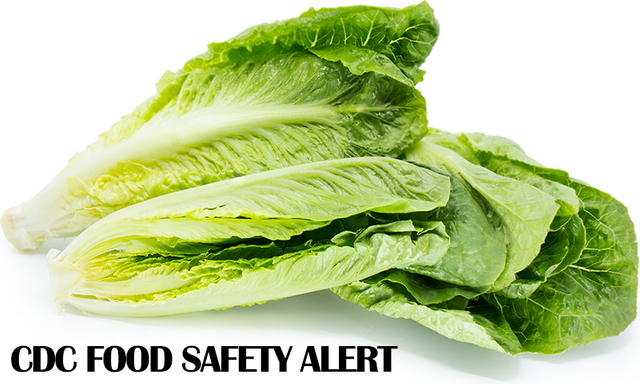CDC Food safety alert: Romaine Lettuce - Rinse and kill E.coli O157, or throw away?

To wash, or throw away; that is the question.
The CDC issued a food safety alert advising people to stop eating and serving romaine lettuce due to a break out of E.Coli O157; but do you really have to throw away lettuce contaminated with E.Coli? (and more importantly, do you really think that every farm's romaine lettuce is contaminated with E. Coli at the same time?)
A study titled "Effects of household washing on bacterial load and removal of Escherichia coli from lettuce and "ready-to-eat" salads" determined that rinsing with water alone was inefficient at eradicating bacterial contamination, but this study published in the International Journal of Food Microbiology concluded that "vinegar, lactic acid or oregano aqueous extract alone or in combination, as alternative washing solutions to chlorine, may be effectively used to control E. coli O157:H7 and sustain acceptable appearance of fresh cut spinach and lettuce".
The study titled "Methodology for modeling the disinfection efficiency of fresh-cut leafy vegetables wash water applied on peracetic acid combined with lactic acid." found that peracetic acid combined with lactic acid "seems to be better suited than chlorine for disinfecting process wash water with a high organic load but a higher disinfectant residual is necessary due to the slower E. coli O157 inactivation kinetics when compared to chlorine".
This study found that Hibiscus extract "caused a significantly greater reduction ( P < 0.05) in concentration of all food-borne bacteria on contaminated romaine lettuce, spinach, and coriander than did the sodium hypochlorite, colloidal silver, and acetic acid", and that "Dry roselle calyx extracts may potentially be a useful addition to disinfection procedures for romaine lettuce, spinach, and coriander".
A study titled "Antimicrobial activity of plant essential oils against Escherichia coli O157:H7 and Salmonella on lettuce" done by the Department of Nutrition and Food Science found that " The effect of essential oils was comparable to that of 5 ppm free chlorine in reducing E. coli O157:H7 and Salmonella populations on iceberg and romaine lettuce throughout the storage time. The natural microbiota on treated lettuce leaves increased during the storage time, but remained similar (p>0.05) to those treated with chlorine and control (water). The texture and the color of iceberg and romaine lettuce treated with essential oils were not different from the control lettuce after 14 days of storage. This study demonstrates the potential of Sporan(®) and cinnamaldehyde as effective lettuce washes that do not affect lettuce color and texture." -- Cinnamaldehyde can be bought here on Amazon
Another study in the Journal of Food Science concluded that "all pathogens were completely inactivated in neutral pH electrolyzed (NEO) water wash solutions. No detrimental effects on the visual quality of the produce studied were observed under all treatment conditions". Not exactly sure about how applicable that is for the typical consumer, but it's interesting regardless.
A study that can be found in the Journal of Food Protection called "Evaluation of treatments for elimination of foodborne pathogens on the surface of leaves and roots of lettuce" concluded that "Dipping in 80% ethanol for 10 s followed by immersion in 0.1% HgCl2 for 10 min was determined to be the most effective surface disinfection method for inactivating E. coli O157:H7 on lettuce leaves and roots and was also validated for inactivating Salmonella and L. monocytogenes".
A study called "Application of an oregano oil nanoemulsion to the control of foodborne bacteria on fresh lettuce" concluded that "applying oregano oil nanoemulsions to fresh produce may be an effective antimicrobial control strategy."
So what do you think? Follow the universal prescriptions of the CDC and stop eating romaine lettuce until they advise otherwise; or be proactive, educate yourself, and try to wash your produce to best protect yourself from infection? How likely do you really think it is that your local source of romaine lettuce is contaminated with lethal levels of E.Colo O157?
Yeah I'm not dipping my romaine lettuce in a Mercury chloride solution :D
I think I'd be pass on that one too, but hibiscus extract is not mercury chloride, cinnamaldehyde is not mercury chloride, lactic acid is not mercury chloride, vinegar is not mercury chloride, oregano is not mercury chloride, peracetic acid is not mercury chloride. I wonder how ethanol would work combined with one of the other methods that do not include mercury chloride.
Wait what? Oh man, I've been making my pizza sauce all wrong!
This post has been voted on by the SteemSTEM curation team and voting trail.
If you appreciate the work we are doing then consider voting us for witness by selecting stem.witness!
For additional information please join us on the SteemSTEM discord and to get to know the rest of the community!